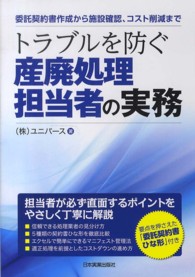- ホーム
- > 洋書
- > 英文書
- > Business / Economics
基本説明
Published jointly with UNESCO Publishing.
Full Description
'This book bridges disciplines, previously confined to specialist journal publications, by providing a comprehensive overview of the systems analysis application to water resources. It is ideal for Masters-level courses in Water Resources Engineering where modern management techniques of optimization and modelling are highly important in the strategic management of a vital resource.' - Derek Clarke, University of Southampton, UK
'The great novelty of this book is that it presents in detail how fuzzy-set theory can be used in water resource system management. The author was one of the pioneers who opened up this new field and is considered to be one of the greatest experts in it.' - Rodolfo Soncini Sessa, Politecnico di Milano, Italy
Water resources management is increasingly interdisciplinary and must take into account complex socioeconomic factors and environmental variables. This book describes the 'systems approach' and its application to contemporary water resources management, focusing on three main sets of tools: simulation, optimization and multi-objective analysis. This approach is presented within the context of sustainable planning and development under conditions of uncertainty. Managing Water Resources: Methods and Tools for a Systems Approach introduces system dynamic simulation as a tool for integrated modelling and contains coverage of the use of fuzzy sets for incorporating objective and subjective uncertainties. The book combines theory with many practical examples, as well as including programs and exercises on downloadable resources. It comprises both an advanced text for students of water resources and civil or environmental engineering and a practical guide for professionals. Published jointly with UNESCO and International Hydrological Programme
Contents
Preface
Foreword
Introduction
Part I: Setting the Stage
1. An Overview
2. Changing Water Resources Management Practice
3. An Introduction to Water Resources Systems Management
Part II: Applied Systems Analysis
4. General Systems Theory
Part III: Water Resources Systems Management
5. Introduction to Methods of Water Resources Systems Management
6. Water Resources Systems Management Under Uncertainty - a Fuzzy Set Approach
7. Water Resources Systems Management for Sustainable Development
Part IV: Implementation of Water Resources Systems Management Tools
8. Simulation
9. Optimization
10. Multi-objective Analysis
Part V: Water for Our Children
11. The Future of Water Resources Systems Management
Index







